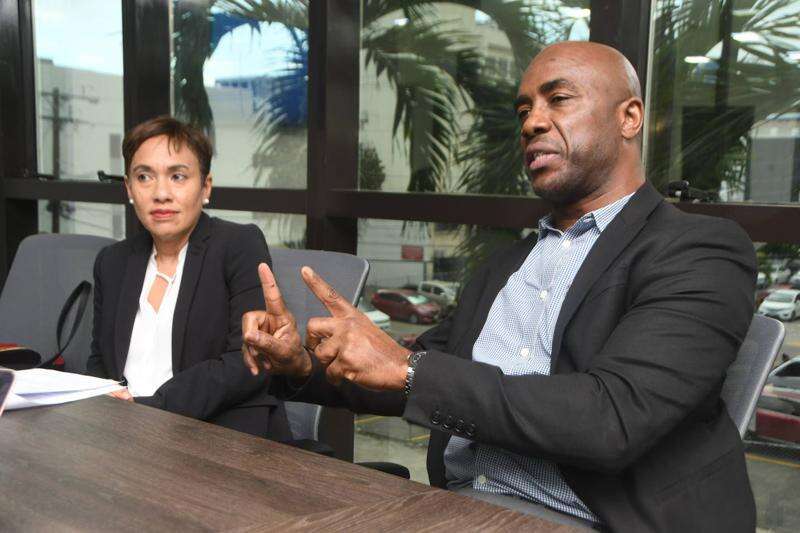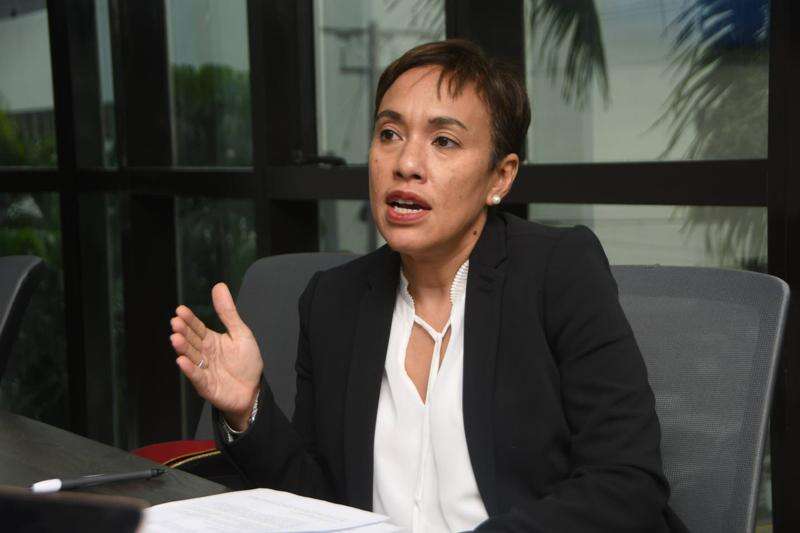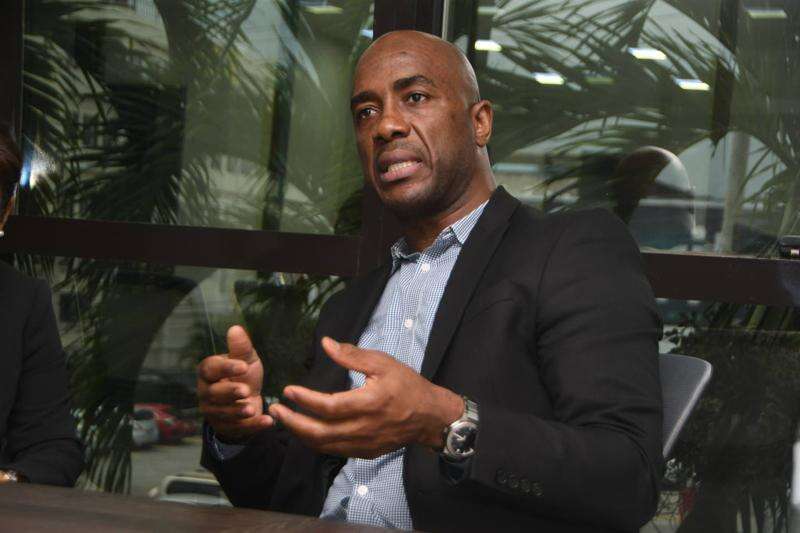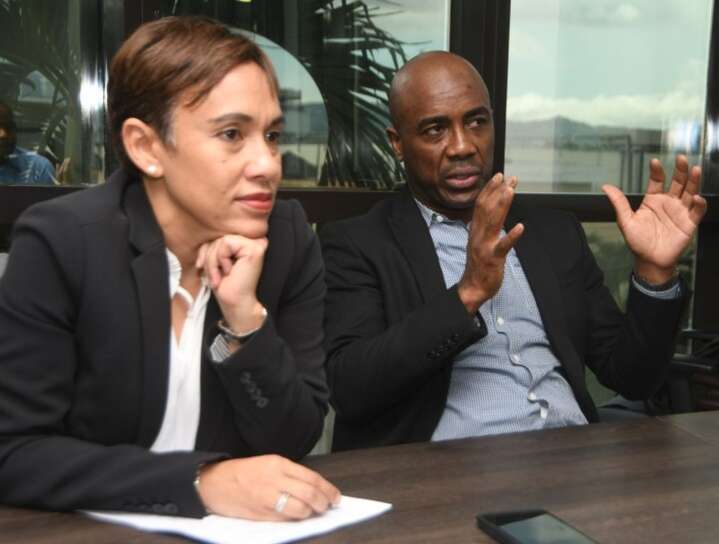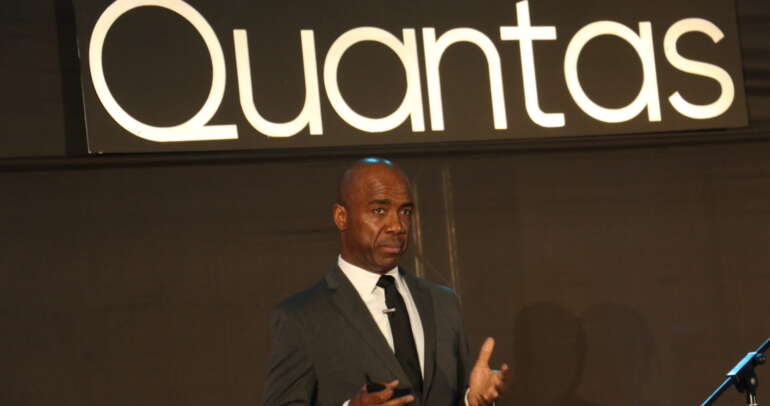FORMER Scotia Group President and CEO Jacqueline Sharp, and financial economist Dr Adrian Stokes have launched Jamaica’s newest financial entity, Quantas Financial Group, aiming to “open up the menu” of options available to investors.
“Officially, Quantas Financial Group started operations about four months ago,” Stokes, who will operate as the entity’s chief executive officer, told the Jamaica Observer in an exclusive interview. Stokes, who is the former head of wealth and insurance at Scotia Group Jamaica, left that post in February. At the time, the Scotia Group in a release to the Jamaica Stock Exchange said he was “leaving the business to pursue other opportunities”.
Those opportunities it turns out is a push into the market for contractual cash flow, including but not limited to, trade receivables — a market Stokes said has been conservatively estimated at US$4 billion ($600 billion).
“We are looking to give investors the ability to invest in a vehicle that does securitisation. So effectively, what this vehicle does, it purchases different cash flows/receivables, packages or securitises these receivables to create new securities, and then sell these securities to end-users like pension funds, insurance companies or accredited individual investors who are concerned about credit and other major market risks in the current market environment. In doing so, investors earn a return from the profit that we make,” the Quantas Financial Group CEO outlined.
The first investment solution from Quantas as indicated is a securitisation vehicle.
“We have various types of trade receivables looking at right now. We have a very big pipeline of over US$140 million right now,” he added.
“What we are doing is not completely novel and new. It’s just new to our market,” Sharp who is the board chair for the Quantas Financial Group outlined. Sharp, who left the Scotia Group in October 2017 to join her family business, added: “These are things that are happening in more sophisticated developed markets. If you look at the US, for example, that market is about US$14 trillion, a huge market for receivables financing. In the Caribbean and Latin American region, we’re looking at about US$1.5 trillion and we are estimating that Jamaica is about US$4 billion ($600 billion),” she continued.
“That’s just from data that are publicly available,” Stokes chipped in highlighting that there are much more receivables that are not publicly known which presents a “big-big opportunity”.
Outside of the US treasuries, it is the biggest section of the market, he noted. According to Securities Industry and Financial Markets Association (SIFMA), the US treasuries market is valued at US$46 trillion.
Sharp and Stokes say the motivation behind starting Quantas is to improve the allocation of capital in Jamaica and across the Caribbean.
“The financial markets in our region are still at an early stage of development. Many good investment ideas never get started because they lack access to capital. Therefore, economic growth and development in our region is relatively low. Economic development in our region will be given greater impetus as our financial markets develop and improve the allocation of capital. Quantas was formed to continue the development of the financial markets in our region, and by doing this we will help create solutions for a better Caribbean and a better world,” they outline.
Quantas Financial Group itself is made up of three entities — Quantas Capital, Quantas Investments and Quantas Management. “The name of the company actually derives from the Latin word quantus, which means, how great,” Stokes pointed out. “Then we work with our marketing team to come up with Quantas, which is a play on the word quantus.”
So far, it targets asset-backed securities (ABS) which are financial investments that are collateralised by an underlying pool of assets—usually ones that generate a cash flow from debt, such as loans, leases, credit card balances, or receivables.
“Effectively, what we focus on is providing investors with non-traditional financial solutions. As you know, you have your regular bonds and equities and repos which are your traditional investment solutions. What we do, we provide investors with additional asset classes so that they can diversify their investment portfolios,” Stokes added as he noted that he didn’t want Quantas Financial Group to dabble in the market where other entities “are already doing a good job”.
Asked if the company intended to diversify from that market, Stokes replied: “There are different types of solutions that we will bring. We don’t want to say too much at this stage apart from the opportunity we have in the market now, which is the securitisation vehicle. Importantly though, a key part of what we do, we innovate. We do no replicate existing investment opportunities. We believe the guys in the market are doing a very good job with the various opportunities that are available. So, we are not intending to create replicas of the existing opportunities in the market. So, importantly what you will see just like this new investment opportunity that we have in the market, it’s going to be new, it’s going to be innovative and importantly it is going to provide investors with a diversification of opportunities, different from what exists in the market.”
“We think it is an exciting opportunity for us because we saw the need. I certainly saw [the need] while I was at Scotia and, of course, Adrian would have seen it more in his recent role as the head of investments and insurance at Scotia,” Sharp added. “The reality is that there are pension funds and institutional investors who have cash and very few options to invest those funds, and so at the same time at the other end you have people who need financing, especially on the longer end which banks typically cannot fund, and they need creative structures. So really what this company is about is being in the middle and pulling the two together,” the Quantas chair explained.
Stokes was, however, quick to point out that while the company is going after receivables, “we’re looking at those receivables that are good receivables. It’s not just any receivables, because we have a very strict risk management architecture that allows for us to choose quality receivables.”
“When we talk about receivables, we are using the term in a very general way because it includes different types of cash flows. You’re talking about leases, for example. So if you’re a company and you have built commercial real estate, and you have tenants that have, rented these shops from you, and they have lease payments that are due over the next three, four, five years, we can buy those leases off the developer or the owner, and pay them cash, which they can go and reinvest into new areas or new projects, etc. So it’s not just your traditional trade receivables, its any type of contractual cash flow.”
“Anything that you put as contractual cash flows that we can understand and it can pass through our conservative risk metrics, then that will be a candidate for us to securitise.”
Sharp added: “These businesses must have strong, predictable cash flows, contractual cash flows that we can understand. We can understand the history, we can do our due diligence on the counterparty for those receivables. In other words, if you have a building that you have leased to someone, we want to understand who is a person that you have leased to? Are they of good character? Do they normally pay on time and so on. What is their business model that shows they have the ability to meet these contractual cash flow.”
So far, the Quantas Financial Group has pulled together an impressive listing of financial gurus to lead the drive. Apart from Stokes who is the CEO, the team is made up of Stanley Thompson, who is the executive vice-president for product innovation; Sitarah Smith, executive vice-president for treasury services; Layne Atkinson, executive vice-president for risk management; Cherice Lee, vice-president of operations; and Franklyn Anderson, vice-president of product innovation. Stokes said the aim is to increase the number of employees to 15.
While he didn’t say how much money was used to capitalise the entity, he did point out that hotelier Kevin Hendrickson and CEO of the CB Group Matthew Lyn are key strategic partners. Both are directors of Quantas Financial Group along with Oliver “Ollie” McIntosh, the founder and president of Verticast Media Group, and Denise Williams, a former senior vice-president for communications at Cable & Wireless. Sharp and Stokes are the other board members.
“We want to collaborate with existing players. We see ourselves as collaborators. In other words, most if not all of the things that we create, we will be able to work with the existing players in the market. For example, on the pension fund side, one of the things that we will do is to give them additional opportunity to diversify their portfolios. Right now most of what they have are bonds, equity, real estate and pension funds and their investors are in need of additional asset classes to properly diversify their portfolios.”
But the company is not only targeting Jamaica. Sharp and Stokes have their eyes set on the Dominican Republic and Trinidad already.
